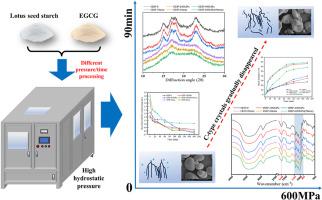High hydrostatic pressure technology promotes the formation of lotus seed starch and epigallocatechin gallate complex: An evaluation of structure and digestive characteristics
IF 6
1区 农林科学
Q1 FOOD SCIENCE & TECHNOLOGY
引用次数: 0
Abstract
The susceptibility of Epigallocatechin-3-gallate (EGCG) to pH changes in digestive juices hampers its potential to regulate the intestinal microecological environment. The study used lotus seed starch (LS) as the embedding carrier and high hydrostatic pressure (HHP) as the non-thermal processing technology to investigate structural changes in LS-EGCG complexes under different pressures and action times, as well as their digestion characteristics. The results indicated that the composite maintained a C-type structure at pressures ranging from 0 to 400 MPa, but the C-type crystal structure disappeared at a treatment pressure of 600 MPa. The swelling and solubility of the complex increased during HHP treatment, while all indexes of pasting properties decreased. Particularly at a pressure of 600 MPa, the pasting properties significantly decreased, indicating enhanced thermal stability and a certain inhibitory effect on aging. The results of in vitro digestion showed that as the intensity of HHP treatment increased, the complex system became more sensitive to digestive enzymes and resulted in an enhanced release of EGCG during digestion. Notably, at 600 MPa for 90 min, the intestinal delivery efficiency of EGCG was significantly improved. These findings provide a research foundation for enhancing the bioavailability of EGCG and developing functional prebiotics containing polyphenols.

高静水压技术促进了莲子淀粉和表没食子儿茶素没食子酸酯复合物的形成:对结构和消化特性的评估
表没食子儿茶素-3-棓酸盐(EGCG)易受消化液pH值变化的影响,这阻碍了其调节肠道微生态环境的潜力。该研究以莲子淀粉(LS)为包埋载体,以高静水压(HHP)为非热加工技术,研究了LS-EGCG复合物在不同压力和作用时间下的结构变化及其消化特性。结果表明,复合材料在 0 至 400 兆帕压力下保持 C 型结构,但在 600 兆帕处理压力下 C 型晶体结构消失。在 HHP 处理过程中,复合材料的膨胀性和溶解性增加,而粘贴性能的所有指标均下降。特别是在 600 兆帕压力下,粘贴性能明显下降,这表明热稳定性增强,对老化有一定的抑制作用。体外消化结果表明,随着 HHP 处理强度的增加,复合物体系对消化酶更加敏感,导致消化过程中 EGCG 的释放增加。值得注意的是,在 600 兆帕持续 90 分钟的条件下,EGCG 的肠道输送效率明显提高。这些发现为提高 EGCG 的生物利用率和开发含有多酚的功能性益生元奠定了研究基础。
本文章由计算机程序翻译,如有差异,请以英文原文为准。
求助全文
约1分钟内获得全文
求助全文
来源期刊

LWT - Food Science and Technology
工程技术-食品科技
CiteScore
11.80
自引率
6.70%
发文量
1724
审稿时长
65 days
期刊介绍:
LWT - Food Science and Technology is an international journal that publishes innovative papers in the fields of food chemistry, biochemistry, microbiology, technology and nutrition. The work described should be innovative either in the approach or in the methods used. The significance of the results either for the science community or for the food industry must also be specified. Contributions written in English are welcomed in the form of review articles, short reviews, research papers, and research notes. Papers featuring animal trials and cell cultures are outside the scope of the journal and will not be considered for publication.
 求助内容:
求助内容: 应助结果提醒方式:
应助结果提醒方式:


